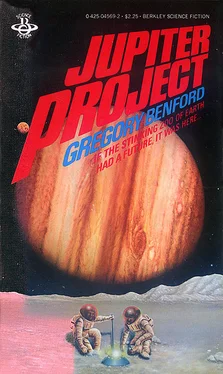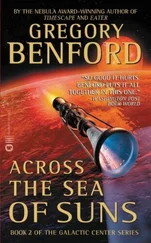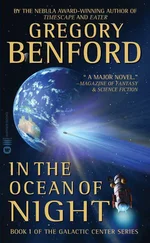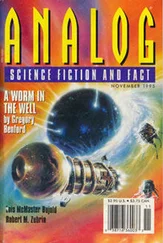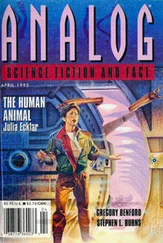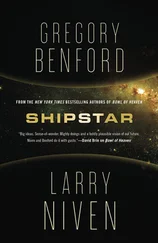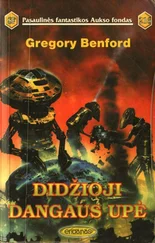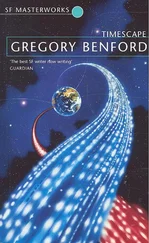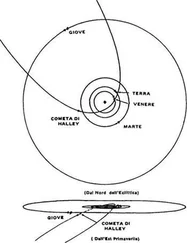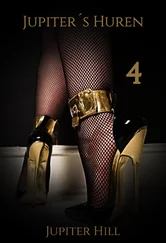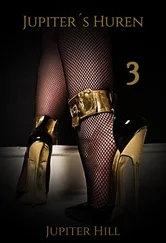When we came out I steered us toward the white rectangle I had noticed before. It was set into the wall of the pit, flush with the rock, and measured about a hundred meters on a side.
There were odd-shaped openings in it, some with curlicues of metal standing beside them. I found it hard to get my bearings as we approached. Piloting in that vast inky dark was unnerving.
I stopped about ten meters from the face of the thing, and Lieutenant Sharma turned around and pointed out two men to go with him. They cast off together and coasted over, using their suit jets. Not until they had touched down on the surface of the thing did I recognize one of them as my father.
There was an eerie stillness about the place. No one talked. They examined the surface for a few minutes. Then my father said it seemed like aluminum but was stronger. They conferred about their next move and decided to go into one of the openings.
Something that looked like an abstract metal sculpture was set in next to the nearest opening. They carefully clipped a line to it. Then the Lieutenant disappeared from sight over the edge of the hole. The opening was as big as the Roadhog and seemed to have smooth sides. My father snaked in after the Lieutenant, following the line. The third man hung at the edge, looking down and holding a hand flashlight for illumination.
We waited. As soon as Dad and the Lieutenant were out of sight we lost radio contact with them. The other men started talking, but I ignored them. I was busy watching the mouth of the opening and looking for anything coming at us from the darkness all around. Nothing moved. A distant circle framed glowing stars; that was the mouth of the pit. We must have come seven or eight kilometers into J-11, at least.
Minutes crawled by. It was spooky, sitting there in nearly total darkness. It seemed as though my father had been gone a long time. What could they be doing in there? I wondered if Commander Aarons knew how long they had been in. Maybe he hadn’t noticed—
The man at the edge waved to someone below. A moment later my father coasted out, holding the line. The Lieutenant followed. They touched helmets and gestured back at the opening.
After a moment Lt. Sharma looked our way and said over radio, “Why don’t three more come down. I’m sure you all have measurements to make.”
I didn’t wait for the three to be picked. I swarmed over the side and flew across on jets. The white metal rang faintly under my boots as I landed. For a few minutes I helped set up cameras and other gear. Then I drew Dad aside.
“How long are we going to be here. Dad?” I said. “I’d like to have a look inside.”
“Not long enough. I don’t want people haphazardly wandering around, anyway. Could be dangerous.”
I looked around at the warped and tangled fingers of metal. I shivered. Standing here among them I felt a cold strangeness.
“Well, okay. But—who were they?”
“The people who built this?” He shook his head. “No way to tell. From the size of the doorways inside—if that is what they are—I would say they were large, at least twice as tall as we are.”
“They couldn’t be from Jupiter?”
“Not likely. Jupiter is a thick atmosphere over an even thicker ocean. There are no continents down there, no land at all. Could a fish discover fire—or build a rocket?”
“What other possibilities are there? There wasn’t any life on Mars, or even Ganymede.”
“They weren’t from this system, Matt. I just saw some evidence to support that when I was inside. There is a—well, I can only guess that it’s a display board, but I don’t know how it works. It came to life when I entered the room. It seems to be a holographic three-dimensional projection of the nearby stars, with Sol at the center.
“About five light-years away, as nearly as I can estimate, there is a green object. It’s at a point just beyond the Centauri system, where I know there isn’t any star. Besides, the green dot lies on a thin blue line that runs inward from the edge of the projection. The blue line stops here—at Sol. Something tells me the blue is a charted course for a star ship, and that green dot is the ship.”
“Five light-years out. Maybe someone was here before the Can was constructed, and left.”
Dad smiled. “I think we would have noticed something. We’ve had probes around Jupiter for fifty years.”
“Then they’re not going away? They’re…coming?”
“That’s my guess. It fits the rest.”
“What rest?”
“This tunnel. Those metal rings we saw reminded me of our ion engines. I’ll bet they are superconducting magnets. The tunnel is a giant induction accelerator.”
I blinked. “Huh? for what?”
“The meteoroid swarms. Look at that thing,” he said, pointing off into the gloom at the huge rock “cork” we had found blocking the tunnel. “I have a hunch that will be the next swarm we see. Something is pumped into it through those pipes, then it’s broken up and accelerated down this tube. A giant shotgun.”
“Aimed at the poles of Jupiter,” I said.
“Yes…” I could see Dad was thinking. He looked at some of the oddly twisted metal around us and frowned. Whatever the metal was, it had iron in it; our magnetic boots held. “You know, Matt,” he said at last, “I’m not a believer in coincidence. The storms, the meteor swarms, suddenly you found life spiraling out of the atmosphere on electric field lines—it all happened at once.”
“I wonder what we would find if we opened that rock cork in the tunnel,” I said thoughtfully.
“What do you mean?”
“Could somebody be, well, seeding Jupiter? Getting it ready for whatever is in that star ship?”
“Seed it for what?”
“I don’t know. To produce food? Maybe for a fish that can build star ships?” I grinned.
“That’s a big project. Jupiter has millions of times the life-supporting volume Earth does.”
“Size won’t stop men; I don’t see why it should stop anything else that can think. In fifty years we might be wrapping a sheet around Ganymede’s atmosphere to keep the oxygen in and make a better greenhouse out of it. Given time maybe we can do something with Jupiter, too—if somebody doesn’t beat us to the property first.”
Dad gingerly touched one of the metal things. “Perhaps…perhaps. We’re all going to be cooking up theories about this place, and no one will know the right answer until that green dot gets here.”
“You and I will be around to see it happen. Dad,” I said. “ISA can’t ship me Earthside now.”
“Not without a fight from me, and the Commander too, I expect.” He waved to the other men. “Better pack up!” he called. “We ought to bring the whole expedition down and set up a base at the edge of the crater. We want to do this carefully.”
He moved over to talk to the rest. I looked back at the beckoning circle at the end of the tunnel. The Sagan was a sharp bright point framed by Jupiter’s smoky bands.
Jupiter changes constantly. Her bands are an elaborate waltz of white streamers, crimson splotches, lacy brown filaments. The Red Spot seethes and churns. I was going to see a lot of the bands; I might spend my whole life out here.
Somebody has to be around when the owners of J-11 return. There’ll be a whole colony out here by then, waiting. Zak would stay, probably, despite his fatalism. Mom and Dad, yes—it was in their blood.
Jenny, too—and what that meant for me I couldn’t say. Not yet.
Yuri might even stay. Well, I’d handle that too.
That chilling knot of fear in me was gone now, burned away. I’d been carrying that fear since I was a kid. If it ever came back I could recognize it, overcome it. A lot of problems are like that—they wither away if you look at them straight on, unflinching. To grow, gamble. Self-knowledge isn’t always bad news, after all.
Читать дальше
